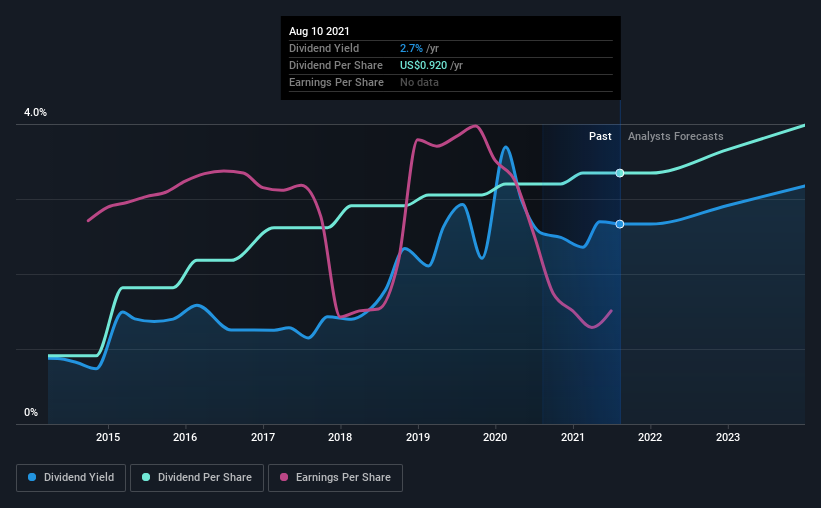Why It Might Not Make Sense To Buy RE/MAX Holdings, Inc. (NYSE:RMAX) For Its Upcoming Dividend
It looks like RE/MAX Holdings, Inc. (NYSE:RMAX) is about to go ex-dividend in the next four days. The ex-dividend date is usually set to be one business day before the record date which is the cut-off date on which you must be present on the company's books as a shareholder in order to receive the dividend. The ex-dividend date is important as the process of settlement involves two full business days. So if you miss that date, you would not show up on the company's books on the record date. Accordingly, RE/MAX Holdings investors that purchase the stock on or after the 16th of August will not receive the dividend, which will be paid on the 31st of August.
The company's next dividend payment will be US$0.23 per share, on the back of last year when the company paid a total of US$0.92 to shareholders. Last year's total dividend payments show that RE/MAX Holdings has a trailing yield of 2.7% on the current share price of $34.52. We love seeing companies pay a dividend, but it's also important to be sure that laying the golden eggs isn't going to kill our golden goose! We need to see whether the dividend is covered by earnings and if it's growing.
See our latest analysis for RE/MAX Holdings
If a company pays out more in dividends than it earned, then the dividend might become unsustainable - hardly an ideal situation. RE/MAX Holdings distributed an unsustainably high 149% of its profit as dividends to shareholders last year. Without extenuating circumstances, we'd consider the dividend at risk of a cut. Yet cash flow is typically more important than profit for assessing dividend sustainability, so we should always check if the company generated enough cash to afford its dividend. It paid out 23% of its free cash flow as dividends last year, which is conservatively low.
It's good to see that while RE/MAX Holdings's dividends were not covered by profits, at least they are affordable from a cash perspective. If executives were to continue paying more in dividends than the company reported in profits, we'd view this as a warning sign. Extraordinarily few companies are capable of persistently paying a dividend that is greater than their profits.
Click here to see the company's payout ratio, plus analyst estimates of its future dividends.
Have Earnings And Dividends Been Growing?
Companies with falling earnings are riskier for dividend shareholders. If earnings fall far enough, the company could be forced to cut its dividend. RE/MAX Holdings's earnings per share have fallen at approximately 14% a year over the previous five years. When earnings per share fall, the maximum amount of dividends that can be paid also falls.
The main way most investors will assess a company's dividend prospects is by checking the historical rate of dividend growth. In the past seven years, RE/MAX Holdings has increased its dividend at approximately 20% a year on average. That's intriguing, but the combination of growing dividends despite declining earnings can typically only be achieved by paying out a larger percentage of profits. RE/MAX Holdings is already paying out a high percentage of its income, so without earnings growth, we're doubtful of whether this dividend will grow much in the future.
The Bottom Line
From a dividend perspective, should investors buy or avoid RE/MAX Holdings? It's not a great combination to see a company with earnings in decline and paying out 149% of its profits, which could imply the dividend may be at risk of being cut in the future. Yet cashflow was much stronger, which makes us wonder if there are some large timing issues in RE/MAX Holdings's cash flows, or perhaps the company has written down some assets aggressively, reducing its income. With the way things are shaping up from a dividend perspective, we'd be inclined to steer clear of RE/MAX Holdings.
With that being said, if you're still considering RE/MAX Holdings as an investment, you'll find it beneficial to know what risks this stock is facing. Every company has risks, and we've spotted 5 warning signs for RE/MAX Holdings you should know about.
If you're in the market for dividend stocks, we recommend checking our list of top dividend stocks with a greater than 2% yield and an upcoming dividend.
This article by Simply Wall St is general in nature. We provide commentary based on historical data and analyst forecasts only using an unbiased methodology and our articles are not intended to be financial advice. It does not constitute a recommendation to buy or sell any stock, and does not take account of your objectives, or your financial situation. We aim to bring you long-term focused analysis driven by fundamental data. Note that our analysis may not factor in the latest price-sensitive company announcements or qualitative material. Simply Wall St has no position in any stocks mentioned.
Have feedback on this article? Concerned about the content? Get in touch with us directly. Alternatively, email editorial-team (at) simplywallst.com.

